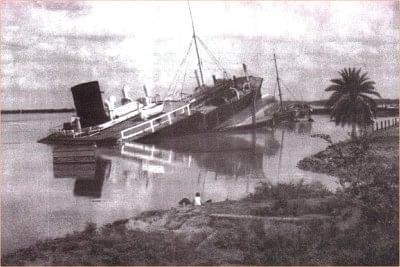Chittagong freed on December 17

Indian naval army detains a ship of Pakistan occupation forces at Chittagong Port during the War of Liberation.Photo: File Photo
Our victory in the War of Liberation is our absolute pride. The surrender of 93,000 occupational forces on December 16, 1971 after nine months of freedom fight is an ever great achievement for the people. But unfortunately as events rolled then, the port city was liberated on December 17, a day later than Dhaka.
Nonetheless, the belated victory of the port city was exceptional. The occupational army lined up at the historical Chittagong Circuit House on the day to surrender themselves and accept the freedom fighters' triumph.
The then commander of freedom fighters also a war hero, Dr Mahahfujur Rahman recollected the events of the final days and said two divisions of freedom fighters, one led by Sector Commander Captain Rafiqul Islam was obstructed by the occupational army at Kumira of Shitakunda. The battalion of the sector commander did not enter the city on December 16, so it was not possible to free the city on that day”.
The Joint Commands, however, defeated the enemy and entered the city on December 17.
Rahman, who is also a researcher on the War of Liberation, said from the southern part of the port city Commander Jafar Imam entered.
Anti-liberation forces, who were aiding the occupational forces, Al Bad'r escaped from Dalim Hotel and Dewan Hotel where they were manning an outpost.
Rahman, who was also the operation commander of the city, said the Pakistani Army surrendered in the city to the Joint Command of Indian forces and Bangalee guerrillas. At the time Engineer Afsur uddin was the city commander of Bengal Liberation Front (BLF) and Freedom Fighters (FF) who directed a group of his fighters to go to Kalurghat Radio Station and broadcast the news of the victory to the nation.
“To maintain law and order situation in the city from December 17 we were assigned at different strategic points. I was responsible for Bandar, Pahartali and Double Mooring,” he added.
“It was our duty to contain the situation so that the angry Bangalees did not attack the Biharis who had committed atrocities on our population.”
Terming it the most memorable day in his life, he said thousands of people with national flags in their hand chanting slogans of 'Joy Bangla' took to the streets and rejoiced.
He said people from all walks of life took to the streets to welcome the freedom except a handful number of Razakars, Al Badr and the notorious gangs of Fazlul Kader Chowdhury.
BLF and FF Commandar Harun, Haris, Moinuddin Khan Badal, Dr Jafar, Raisul Hoq Bahar and Shahabuddin played the vital roles.
It was now time to rebuild the country. But the port city had to start from zero. During the nine months of war, all infrastructures were ruined. The Pakistani forces and their local friends not only killed thousands of Bangalees, they also destroyed vital infrastructures required for building a nation.

 For all latest news, follow The Daily Star's Google News channel.
For all latest news, follow The Daily Star's Google News channel. 



Comments